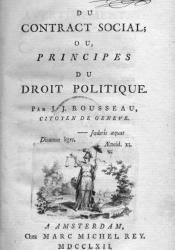The Social Contract and Coleridge Rejection of it
The social contract theory says that individuals live in line with an agreement that sets up political and moral rules of behavior. In 1762 Rousseau declared in it: “Man is born free and everywhere he is in chains” which dissatisfied intellectuals and artists, and as a consequence, they challenged the Enlightenment. Coleridge's early works critique Rousseau's luxury and regularly suggested the general will, making Rousseau look like a Christ-like figure. Coleridge’s subsequent disappointment with Pantisocracy led him to reject Rousseau and the social contract. In “The Rime of the Ancient Mariner” with the mariner’s relationship with the albatross and the wedding that frames the poem, Coleridge defines a breaking point between the individual and general wills.
Beenstock, Zoe. “Coleridgeâs Exile from the Social Contract, 1795â1829.” University Press Scholarship Online, 2016, www.universitypressscholarship.com/view/10.3366/edinburgh/9781474401036.....
McCombs School of Business at the University of Texas at Austin. “Social Contract Theory.” Ethics Unwrapped, 25 Jan. 2021, ethicsunwrapped.utexas.edu/glossary/social-contract-theory.
“The Social Contract Rousseau.” Wikimedia Commons, 1 Jan. 2021, https://commons.wikimedia.org/wiki/File:Social_contract_rousseau_page.jpg. Accessed 5 Dec. 2021.

